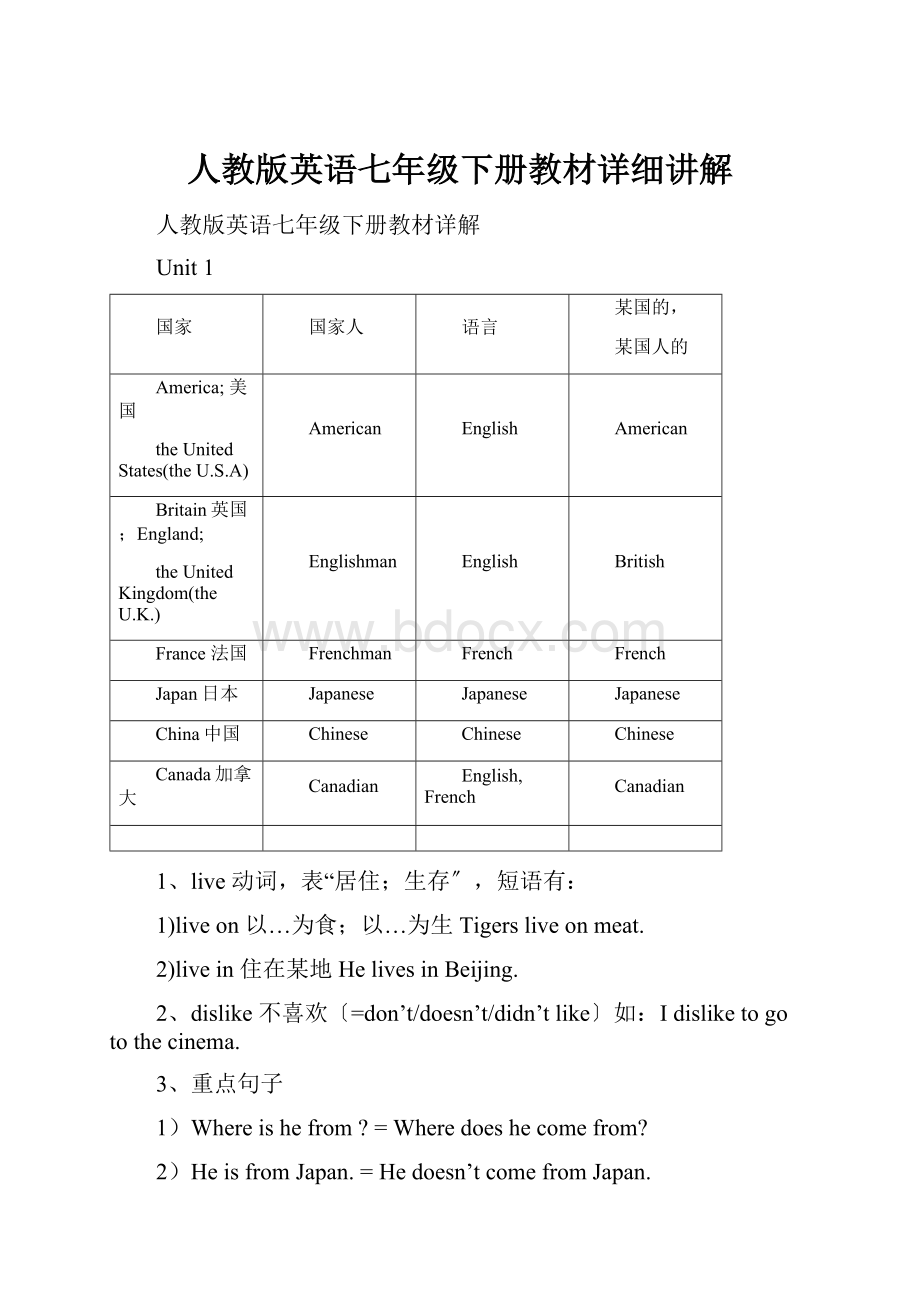人教版英语七年级下册教材详细讲解.docx
《人教版英语七年级下册教材详细讲解.docx》由会员分享,可在线阅读,更多相关《人教版英语七年级下册教材详细讲解.docx(19页珍藏版)》请在冰豆网上搜索。

人教版英语七年级下册教材详细讲解
人教版英语七年级下册教材详解
Unit1
国家
国家人
语言
某国的,
某国人的
America;美国
theUnitedStates(theU.S.A)
American
English
American
Britain英国;England;
theUnitedKingdom(theU.K.)
Englishman
English
British
France法国
Frenchman
French
French
Japan日本
Japanese
Japanese
Japanese
China中国
Chinese
Chinese
Chinese
Canada加拿大
Canadian
English,French
Canadian
1、live动词,表“居住;生存〞,短语有:
1)liveon以…为食;以…为生Tigersliveonmeat.
2)livein住在某地HelivesinBeijing.
2、dislike不喜欢〔=don’t/doesn’t/didn’tlike〕如:
Idisliketogotothecinema.
3、重点句子
1)Whereishefrom?
=Wheredoeshecomefrom?
2)HeisfromJapan.=Hedoesn’tcomefromJapan.
3)Wheredoeshelive?
----HelivesinTokyo.
4)Pleasewritetomesoon.(writetosb.写信给某人=writealettertosb.)
Unit2
1、street表“街道〞,短语:
on/inthestreet在街道上。
2、介词短语
⑴near在…附近⑵nextto紧挨着⑶acrossfrom在…对面
⑷between….and…在A和B之间
⑸infrontof在…外面的前面:
Thereisatreeinfrontofahouse.
⑹inthefrontof在…里面的前面:
Theteacherisinthefrontoftheclassroom.
⑺behind在…外面的后面:
Theballisbehindthedoor.
⑻inthebackof在…里面的后面Myfriendsitsinthebackoftheclassroom.
3、through,across,over,和past都是介词,不能单独做谓语,必须与动词连用才能做谓语。
1〕through从物体部穿过,如:
walkthroughaforest.穿过一个森林
2〕past从物体外面绕过,如:
walkpastapostoffice经过一个邮局
3〕across从物体外表横穿,如:
goacrosstheroad横穿马路
4〕over从物体上空越过,如:
flyoverthecity飞过城市
【注意】pass〔经过〕,cross(横穿)都是动词,可作谓语,相当于“动词+past/across〞.
如:
①Ipass(walkpast)apostofficeeveryday.②Don’tcross(walkacross)theroad.
4、straight⑴形容词,笔直的,直的:
Shehasstraighthair.她长着直发。
⑵副词,直接地Gostraightdowntheroadandthenturnleft.
5、turn
(1)动词,拐turnleft向左拐
(2)名词,拐弯Noleftturn!
禁止左拐弯
6、ontheright在右边,ontheleft在左边
7、open
(1)动词,打开Openthedoor.
(2)形容词,开着的Thedoorisopen.
【注意】close动词,关→closed形容词,关着的。
Thedoorisclosed.
8、clean
(1)动词,打扫Heiscleaningtheroom.
(2)形容词,干净的Theroomisclean.
9、Welcometo+名词,表欢迎到某地WelcometoChina.但Welcomebackhome.(home为副词,副词可以直接修饰动词。
因此,前不用介词to)
10、enjoydoingsth.喜欢做某事〔enjoy后只能接动名词v-ing〕Ienjoy.(read)
11、walk可作名词,如:
takeawalk散步;twentyminutes’walk20分钟的步行
12、beginning名词,开始It’sagoodbeginning.那是一个好的开端。
短语有:
thebeginningof…的开始;atthebeginningof在,,,的开始;
inthemiddleof在…的中间;attheendof在…的最后
13、visit
(1)与物动词①参观,访问visitBeijing②探望visitmygrandpa.
(2)名词,短语:
onavisitto参观某地
TheyareonavisittoBeijing.=TheyarevisitingBeijing.
14、havefun玩得开心,过得愉快=enjoyoneself=haveagoodtime
havefundoingsth.在做某事中过的很愉快IhavefunEnglish.(learn)
15、hope希望,后不接双宾语,既不能说hopesb.todosth.如:
Ihopehimtohelpme.(×)
但可接宾语从句,此句可改为Ihope(that)hecanhelpme.
16、重点句子:
(1)问路①Whereisthehotel?
----It’snextto/behind/infrontoftheschool.
②Canyoutellmethewaytothehotel?
(thewayto去某地的路)
(2)指路GostraightandturnleftatNewPark.笔直往前走,在新公园向左拐。
GothroughSixAvenue.穿过六街
Godownthestreetandit’sonyourleft.沿着街往下走,它在你的左边。
Unit3
1、动物名称词tiger,elephant,dolphin,panda,lion,penguin企鹅,giraffe长颈鹿,koala.树袋熊
2、形容词:
cute可爱的,clever聪明的,smart聪明可爱的,ugly丑陋的,friendly友好的;beautiful漂亮的;shy害羞的;lazy懒惰的。
3、
(1)other形容词,别的,其他的。
Whatotherthingsdoyouwant?
=Whatelsedoyouwant?
(2)others代词,还有一些。
常与some连用。
〔some…,some…,others…一些….,一些…,还有一些〕如:
Therearemanyflowers,somearered,somearewhite,othersareyellow..
(3)another表又一个,另一个。
Haveanothercupoftea.再喝一杯茶〔已经喝了几杯〕
(4)theother〔两者中〕剩下的Ihavetwopen,.Oneisred,theother(one)isblack.
(5)theothers其余的人或物Thereisonlytenboysinmyclass,theothers(=theotherstudents)areboys.
【注意】others和theothers是代词,代替一些人或物。
它们后不加名词,用法同名词性物主代词〔yours,hers,ours….〕
4、sleep动词,睡觉。
从上床到熟睡的过程有:
feelsleepy感到困倦→gotobed上床→fallasleep/gotosleep入睡→beasleep/sleeping
睡着了→wakeup醒来→beawake醒着的
Lastnight,Ifeltsleepy.AndIwenttobedearly.Afterreadingsomestories,Ifellasleep.WhenIwassleeping,theclockwokemeup.Sincethen,Iwasawaketillthenextmorning.
4、during表在…期间,常可以与in替换。
如:
duringtheday=intheday在白天。
5、atnight=inthenight在晚上
6、relax动词,放松,休息。
Wecanrelax(ourselves)onweekends.
【扩展】relaxing令人放松的,轻松的。
Relaxed感到放松的。
加ing表“令人…的〞,加ed表“感到…的〞,类似的词有:
exciting(令人兴奋的),excited〔感到兴奋的〕;interesting(令人感到有趣的),interested〔感到有趣的〕,surprising令人感到吃惊的,surprised感到吃惊的。
8、playwith⑴和某人玩Iliketoplaywithyou〔2〕玩弄某物Look,theboyisplayingwithabasketball.(比拟:
playwithabasketball玩篮球;playbasketball打篮球)
9、重点句子:
(1)Whatanimaldoyoulike?
你喜欢什么动物?
(2)Whatotheranimalsdoyoulike?
你还喜欢别的什么动物?
(3)Whydoyoulikedogs?
----Becausetheyarefriendlyandclever.(Why问句用because答)
Unit4
1、givesb.sth给某人某物=givesth.tosb.把某物给某人
Givemethebook.=Givethebooktome.
2、puton穿→wear穿着;
①Hegotupquickly,andhisuniform.
②Look,heisauniform.
3、teachsb.sth.教某人某事,不能说成teachone’ssth教某人的某事。
MrLiuteachesourEnglish。
〔改错〕→。
4、kindof=alittle一点Myworkiskindofdangerous.
Akindof一种Dogsareakindoffriendlyanimals.
5、goouttodinners到外面吃饭,下馆子。
I’mbusy,let’sgoouttodinners.
6、重点句子:
〔1〕问职业:
Whatdoesyourfatherdo?
=Whatisyourfather’sjob?
=Whatisyourfather?
〔2〕问理想:
Whatdoyouwanttobe?
你想成为什么?
---Iwanttobeateacher.
〔3〕Wehaveajobforyouasawaiter.(for表适合于;as表作为)
〔4〕Doyouwanttoworkforamagazine?
(workfor为…工作、效力)
〔5〕Doyouliketoworkwithotheryoungpeople?
(和某人一起工作,合作)
〔6〕Doyouwanttobeintheschoolplay?
(bein参加)
〔7〕WewantaP.E.teachertoteachsoccer.(wantsb.todosth.想要某人去做某事)
Unit5
1、介词on还可以用于电子媒体前,如:
onthephone,onTV,ontheradio,ontheInternet;onthecomputer.题:
IoftenlearnEnglishtheradio.(A.inB.onC.at)
2、wait是不与物动词,不能直接接宾语,须与for连用。
Waitme(×)→waitforme(√)
3、去购物=dosomeshopping
4、语法:
现在进展时态结构:
be(am,is,are)+v-ing.现在进展时态用法:
⑴表示正在进展的动作
Iamwritingaletternow.(常与now,listen,look等词连用)
⑵表示最近一直在做的一件事〔但说话时不一定在进展〕
IamreadingHarryPotterthesedays.〔常与thesedays/weeks等连用〕
⑶表示即将发生的动作
Iamcoming.我马上来。
〔此类动词常表位置移动:
go,leavefor,visit,arrive等〕
⑷表示总是出现的事情〔含有感情色彩,批评或表扬,常与always连用〕
Heisalwaysborrowingmoneyfromme.他老是找我借钱。
〔批评〕
Heisalwayshelpingothers.他总是帮助别人。
〔表扬〕
5、重点句子:
(1)What’shewaitingfor?
等什么
(2)Whoaretheytalkingto?
和谁谈
(3)Whataretheytalkingabout?
谈论什么
【注意】what和who分别是代事物和人的疑问代词,作waitfor,talkto,talkabout的宾语,而wait,talk都是不与物动词,所以后要加介词,即waitforwhat,talktowho,talkaboutwhat。
疑问代词还有,which,whom等。
问时间when,地点Where,方式how等不是代替人或事物的词都是疑问副词,因为副词可以直接修饰动词,所以不与物动词可以直接使用,如:
①Wherearetheytalking?
〔talk后不带to〕②Whenwillhearrive?
(arrive后不加at,in)
〔4〕Herearesomeofmyphotos.我的照片中的一些在这儿。
【注意】of可表“…中的…〞,如;oneof…中之一;someof…中的一些;manyof…中的很多;mostof…中的大多数。
Some,many,most也可以不与of连用,后直接接名词,如someofmyphotos或somephotosofmine,不能说成somemyphotos.
〔5〕IamwithmysisterGina.(bewithsb和某人在一起)
Unit6
1、rain
(1)名词,雨Don’tgooutintherain.Itisaheavyrain.
(2)动词,下雨Itisgoingtorain.
rainy形容词,下雨的。
Itisrainy/raining.Idon’tlikearainyday.
2.snow
(1)名词,雪Snowiswhite.
(2)动词,下雪Itsnowedheavily/hardyesterday.
snowy形容词,下雪的Itissnowy/snowing.
3.cloud名词,云→cloudy多云的;wind风→windy有风的;sun太阳→sunny晴朗的
4.cook①动词,煮,做饭。
Heiscooking.②名词,厨师Myfatherisacook.
cooker名词,炊具,锅Acookusesacookertocookmeat.
5.study和learn的区别,他们都表学习,常可互换,但study有研究意思,比learn学得深一些。
Ienjoystudying/learningEnglish.
6.Lie有平躺,位于的意思,lie还有撒谎的意思。
Lay意思为放,搁,下蛋。
其过去式、过去分词、现在分词如下:
lie (平躺,位于)-lay-lain-lying 如:
①Heislyingonthebeach.②ItliesinHubei.
lie(撒谎)-lied-lied-lying 如:
Don’tlietome.
lay(放,搁,下蛋)-laid-laid-laying如:
Helaidhiscoatonthebed.
题:
Don’tyourcoatonthefloor.Iteasilygetsdirty.
A.lieB.layC.liedD.laid
7.Cool①凉爽的It’scoolinfall.②好极了Theylookcool.
8.heat①名词,热量Iamsurprisedtheycanplayinthisheat.(在这样的高温下)
②动词,给…加热heatthemilk
9.短语:
①Onvacation在度假②takeaphoto拍照③lookat朝…看
④haveagood/great/wonderfultime玩得高兴,过得愉快=enjoyoneself=havefun.
⑤inthisheat.在这样的高温下
10、重点句子:
(1)问天气:
How’stheweather?
=What’stheweatherlike?
---It’ssunny/windy/cloudy/raining.
(2)How’sitgoing?
(你过得)怎样?
---Prettygood相当好/Great很好/Notbad还可以/Terrible真糟糕
Reviewofunits1—6
1、describe动词,描述Wordscannotdescribemyfeelings.言语不能描述我的感受。
description名词,描述Yourdescriptionofthemaniscorrect.你对他的描述是正确的。
2、following下面的,放于所修饰词前,如:
thefollowingwords下面的单词。
同义词below(下面的)和反义词above(上面的)都用于所修饰词后,如:
thewordsbelow/above.
3、lookfor寻找;find找到;Ilookedforiteverywhere,butIcan’tfinditanywhere.
4、talkabout谈论;talkto/with和某人交谈
5、improve动词,改善,提高。
ItriedmybesttoimprovemyEnglish.
6、inorderto表“为了〞,后接动词原形。
Igetupearlyinordertocatchtheearlybus.
【扩展】⑴inorderto=soasto表“为了,以便〞后都接动词原形,否认形式分别为:
inordernotto和soasnotto如:
Shegotupearlyinorderto/soastocatchtheearlybus.
②inorderto可放句首,而soasto不能。
③soasto可分开使用,而inorderto不能。
如:
Theteacherspokesoslowlyastobeunderstoodbythestudents.
(2)sothat和inorderthat都表“为了,以便〞后都接句子。
sothat引导的从句只能放在句中,而inorderthat引导的从句既可放在句首也可放在句中。
另外,sothat还可引导结果状语从句,意为“因此,结果〞,例如:
①Shegotupearlysothat/inorderthatshecouldcatchtheearlybus.(为了,以便)
②Jackisbadlyillsothathehastorest. 〔因此〕
Unit7
1、popularadj.受欢迎的,流行的。
短语:
bepopularwith受某人的欢迎
LiYuchunispopularwithyoungpeople.宇春受年轻人的欢迎。
2、tall与high都指高,但tall常用于人、树木等细长物〔反义词short短、矮〕,high用于指物而不指人〔反义词low低的〕。
如:
atallman,ahighmountain.
【扩展】tall/high是形容词,名词为height〔高度〕,如:
Themountainishigh,theheightofitis5kilometersabovethesea.类似的有:
long长的→length长度;
wide宽的→width宽度;heavy重的→weight重量
3、alittlebit一点儿
4、joke名词,笑话。
Helovestotelljokes〔讲笑话〕
【短语】playajokeonsb